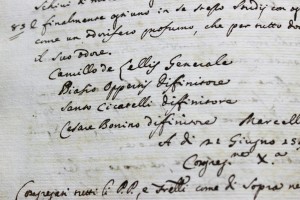 Institutional Charter of the Order approved unanimously by the Second General Chapter (1599)
Institutional Charter of the Order approved unanimously by the Second General Chapter (1599)
A decision of the general session of 19 June.
This contains the basic elements of the charism of the Institute formulated by Camillus in the memorial that was presented to Pope Gregory XIV. They are to be found in the papal Bull Illisu qui pro regis (21-IX-1591) by which the Order (‘Religion’) of the ‘Ministers of the Sick’ was recognised and solemn and public profession by perpetual vows was granted. Camillus, as soon as he had received the Bull, bore it in a profession with the community into the church, kissed it, and then gave thanks to God.
- If, inspired by God, someone wishes to exercise this work of charity, he should know that he must observe in perpetuity poverty, chastity, obedience and service to the sick, for the moment without taking a vow to this effect. This provision, however, does not seek to deprive anyone of his free will: that is to say that he cannot take private vows, if he so wishes, because through this we wish the grace of the Holy Spirit to work freely.
- Whoever wishes to be a part of our Company, before being admitted to it or within a month, should make a general confession of his whole life with a confessor who will be decided by the Superior so as thus to be able to renew himself and make himself more directed towards service to the sick.
- Nobody will have their own property and everything will be held in common. We cannot hold in common any other real property than the house in which we live. No one will venture to have money except the Superior or the Procurator. They will keep all the money in a common treasury which will have two keys. They will each have one of these keys. We will live by alms because we hope that holy poverty will help many to make this Company grow and be preserved in a spirit of piety.
- Nobody will own anything except with the permission of the Superior and when the same Superior so pleases that person will always be ready to deprive himself of that which he has had permission to own. If, therefore, he will need anything he will ask for it from the Superior and if the latter does not grant it to him, he will have patience, persuaded that this is useful for his soul.
- Everyone will obey the Superior with great humility and respect. If someone does not want to obey him, the Superior himself, the first time, will apply to him the due correction; on the second occasion he will give him a penance, but always with all possible charity; if, then, on the third occasion he does not want to obey, he shall be sent out of the Company. The Superior will act in the same way in sending away those who make scandal inside the house or outside it.
- Everyone will go to confession and have Holy Communion at least once a week, that is to say on Sunday, and all will have the same confessor, if this is possible. If, however, this is not possible, each religious brother will have his own confessor and will not receive confession from another without the permission of the Superior.
- Every day everyone together in the Oratory will engage in an hour of meditation, if possible in the early morning. If this cannot be done, each member will attend this meditation during the day, when he has time to do so. Then, in the evening, everyone will engage in an examination of conscience. Every day those that are in the house will recite the litanies together. Those at this time who are not in house will then recite them alone. Those who do not know how to read will say Our Lord’s Prayer five times and a Hail Mary five times.
- Those who are not engaged in providing assistance to the sick or in service in the house will try to go at least once every fifteen days to preaching, and during Lent at least twice a week, where this is the wish of the Superior. Every month it should be so arranged that a spiritual father makes an exhortation to everyone gathered together, if this is possible, which invites them to observe our rules.
- Everyone should listen to Holy Mass every morning, if this is possible. During working days this should not be neglected, unless there is a very important commitment which, at that moment, it is thought is more pleasing to the Lord than hearing Holy Mass.
- Every eight days they should, all gathered together, strive to draw near to Holy Communion and also to lunch together, if this is possible. A meeting should also be held on the needs of the sick, and subjects should also be addressed that work to their spiritual wellbeing and conversion, trying, however, not to hinder service in the hospital so that the presence of some of our members is not achieved.
- Everyone should attend to inner and outer mortification, willingly doing those things for which he feels greatest repugnance, when he is so commanded: this will be of use to him in being more easily charitable towards those who are most gravely sick and with illnesses that are the most difficult to cure.
- If our members are asked to assist sick people in private homes, to go thither will not be against our Institute as long as two go together. The sick person should confess. Service is provided out of love for God, but this assistance in people’s homes should not lead to a neglect of the poor in hospitals.
- All those who wish to conform to our form of life must promise that if the plague arrives (which may God not wish!) they will serve the plague-stricken. They will do this, however, if they have been so commanded by their Superior. But the whole of the Company, both priests and lay, will be obliged to assist the plague-stricken.
- Nobody will go out of the house without the permission of the Superior. Those who go out will go with a companion when this is the wish of the Superior.
- Both in the house and outside, everyone, when this is possible, will observe service, above all when there is a Holy Mass, prayer, and examination of conscience, and when the sign will be given to go and sleep. This is something that everyone must do at the same time so that everyone can get up at the same time.
- Everyone will nurture for the others that honour and respect which is appropriate amongst servants of God. Everyone should see his companion as his Superior.
- When meals are taken, both in the early morning and in the evening, some spiritual readings should ne engaged in, taking advantage often of books that exhort to patience and deal with a good death, so that the religious brothers, thus being more competent, are more suited to helping and comforting the sick in their needs. At table silence should be observed.
- In the house on Wednesdays and Fridays meat, cheese and eggs will not be eaten. In hospitals, on the other hand, or in others places, everyone will eat what is served to them.
- Nobody, without permission, will intervene in the tasks attributed to others. Everyone will attain to good manners and to the way of living found in the Company.
- Nobody, except the Superior, must rebuke with authority other religious brothers. If someone learns of some relevant failing or grave temptation of a religious brother, he should inform the Superior so that he can proceed with charity. Everyone should hold dear that their failings be referred to the Superior by anyone learning about them outside confession.
- They will be careful not to get angry with each other and not present a troubled face: on the contrary, they will demonstrate that lovingness and charity that is appropriate amongst servants of God.
- In eating and sleeping the following order will be followed: they will sleep for seven hours: from getting up until lunch six hours will pass, even when there is fasting; from lunch until supper eight hours will pass. When the time comes to eat, this will be done without waiting for anyone, not even the Superior.
- Even though they may think that they do not deserve it, everyone should accept and very willingly engage in the penances that are imposed on them by the Superior, moved by the wish to receive spiritual help.
- Although amongst us there will be obligatory penances, however those who have committed some failing and wish to walk on the way of perfection will not hold back from asking the Superior often for penance for their defects and will do this willingly in the presence of the other religious brothers so as to provide them with edification and a good example.
- When someone goes out of the house he will walk with modesty, thereby demonstrating that he has zeal for the honour of God. If he finds someone gambling at cards or dice or someone who blasphemes or swears by the name of God and Our Lady or other saints, or publicly does something else that is scandalous against the honour of God, he will correct him with charity, humility and meekness, always demonstrating compassion for him.
- Nobody without the licence of the Superior will attend to the affairs of outsiders, even though they are good things, so that he may give all of himself to service to the sick.
Download here the text ‘Rules of the Company of the Servants of the Sick’








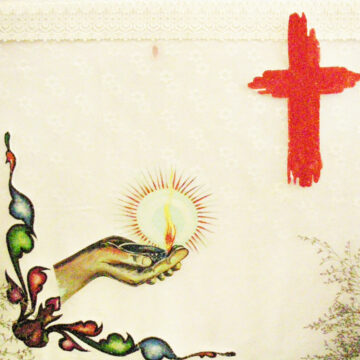
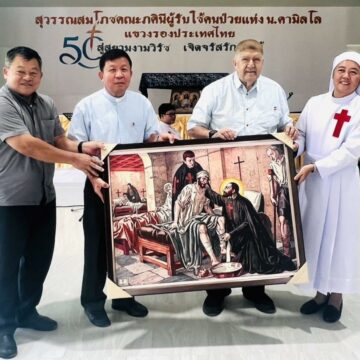
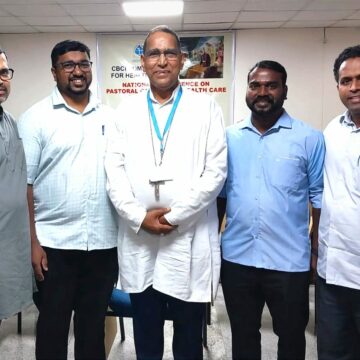


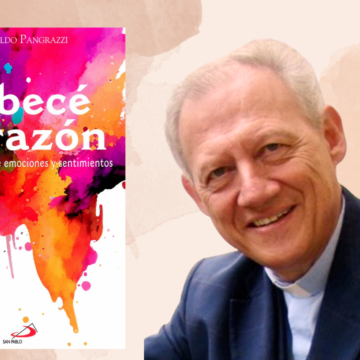
Camillians on Facebook
Camillians on Twitter
Camillians on Instagram